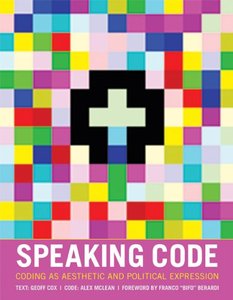 Zusammenfassungen
Zusammenfassungen
 Speaking Code begins by invoking the "Hello World" convention used by programmers when learning a new language, helping to establish the interplay of text and code that runs through the book. Interweaving the voice of critical writing from the humanities with the tradition of computing and software development, in Speaking Code Geoff Cox formulates an argument that aims to undermine the distinctions between criticism and practice and to emphasize the aesthetic and political implications of software studies.
Speaking Code begins by invoking the "Hello World" convention used by programmers when learning a new language, helping to establish the interplay of text and code that runs through the book. Interweaving the voice of critical writing from the humanities with the tradition of computing and software development, in Speaking Code Geoff Cox formulates an argument that aims to undermine the distinctions between criticism and practice and to emphasize the aesthetic and political implications of software studies.
Not reducible to its functional aspects, program code mirrors the instability inherent in the relationship of speech to language; it is only interpretable in the context of its distribution and network of operations. Code is understood as both script and performance, Cox argues, and is in this sense like spoken language--always ready for action. Speaking Code examines the expressive and performative aspects of programming; alternatives to mainstream development, from performances of the live-coding scene to the organizational forms of peer production; the democratic promise of social media and their actual role in suppressing political expression; and the market's emptying out of possibilities for free expression in the public realm. Cox defends language against its invasion by economics, arguing that speech continues to underscore the human condition, however paradoxical this may seem in an era of pervasive computing.
 Dieses Buch erwähnt ...
Dieses Buch erwähnt ...
 Personen KB IB clear | Aristoteles , Albert-László Barabási , Gregory Bateson , Janet H. Beavin , John C. Beck , David M. Berry , Brigitte Bollmann-Zuberbühler , Noam Chomsky , Thomas H. Davenport , Fernando Flores , Heinz von Foerster , Ursula Frischknecht-Tobler , Sandra Wilhelm Hamiti , Hegel , Don D. Jackson , Stanley Kubrick , Patrick Kunz , Bruno Latour , Adrian Mackenzie , Nick Montfort , Ueli Nagel , Douglas Rushkoff , Noah Wardrip-Fruin , Paul Watzlawick , Terry Winograd | |||||||||||||||||||||||||||||||||||||||||||||||||||||||||||||||||||||||||||||||||||||||||||||||||||||||||||||||||||||||||||||||||||||||||||||||||||||||||
 Begriffe KB IB clear | Code
, EmbodimentEmbodiment
, Emergenzemergence
, Formform
,  Gesichtserkennung Gesichtserkennung face recognition
, face recognition
,  GUI (Graphical User Interface) GUI (Graphical User Interface) Graphical User Interface
, Graphical User Interface
,  Lernen Lernen learning
, learning
,  Maschine Maschine machine
, machine
,  Programmieren Programmieren programming
, programming
,  Software Software software
, software
,  Sprache Sprache language language
| |||||||||||||||||||||||||||||||||||||||||||||||||||||||||||||||||||||||||||||||||||||||||||||||||||||||||||||||||||||||||||||||||||||||||||||||||||||||||
 Bücher |
|
 Zitationsgraph
Zitationsgraph
 Zitationsgraph (Beta-Test mit vis.js)
Zitationsgraph (Beta-Test mit vis.js)
 Zeitleiste
Zeitleiste
 7 Erwähnungen
7 Erwähnungen 
- Medienbildung und informatische Bildung - quo vadis? (Klaus Rummler, Beat Döbeli Honegger, Heinz Moser, Horst Niesyto) (2016)


- How To Be a Geek - Essays on the Culture of Software (Matthew Fuller) (2017)

- Bildung und Öffentlichkeit - Eine strukturtheoretische Perspektive auf Bildung im Horizont digitaler Medialität (Dan Verständig) (2017)


- Art education in the post-digital era - Experiential construction of knowledge through creative coding (Tomi Slotte Dufva) (2018)


- Metaphors of code - Structuring and broadening the discussion on teaching children to code (Tomi Slotte Dufva, Mikko Dufva) (2016)


- Metaphors of code - Structuring and broadening the discussion on teaching children to code (Tomi Slotte Dufva, Mikko Dufva) (2016)
- Critical Code Studies (Mark C. Marino) (2020)

- Populismus und Protest - Demokratische Öffentlichkeiten und Medienbildung in Zeiten von Rechtsextremismus und Digitalisierung (Sabrina Schenk) (2024)


- Programmierter Protest? - Ausdrucksformen des Widerstands im digitalen Zeitalter (Juliane Ahlborn, Dan Verständig)

- Zum Verhältnis von Daten, Agency und Selbst - Schokolade ist sehr viel mehr als Schokolade (Estella Ferraro)

- Programmierter Protest? - Ausdrucksformen des Widerstands im digitalen Zeitalter (Juliane Ahlborn, Dan Verständig)
 Co-zitierte Bücher
Co-zitierte Bücher

Kontrolle und Selbstkontrolle
Zur Ambivalenz von ePortfolios in Bildungsprozessen
(Torsten Meyer, Kerstin Mayrberger, Stephan Münte-Goussar, Christina Schwalbe) (2011) Bei amazon.de anschauen
Bei amazon.de anschauen
Eine strukturtheoretische Perspektive auf Bildung im Horizont digitaler Medialität
(Dan Verständig) (2017)

 Volltext dieses Dokuments
Volltext dieses Dokuments
 Bibliographisches
Bibliographisches 
 Beat und dieses Buch
Beat und dieses Buch
Beat hat dieses Buch während seiner Zeit am Institut für Medien und Schule (IMS) ins Biblionetz aufgenommen. Beat besitzt kein physisches, aber ein digitales Exemplar. (das er aber aus Urheberrechtsgründen nicht einfach weitergeben darf). Es gibt bisher nur wenige Objekte im Biblionetz, die dieses Werk zitieren.


















 , 1587 kByte)
, 1587 kByte) 



 Biblionetz-History
Biblionetz-History